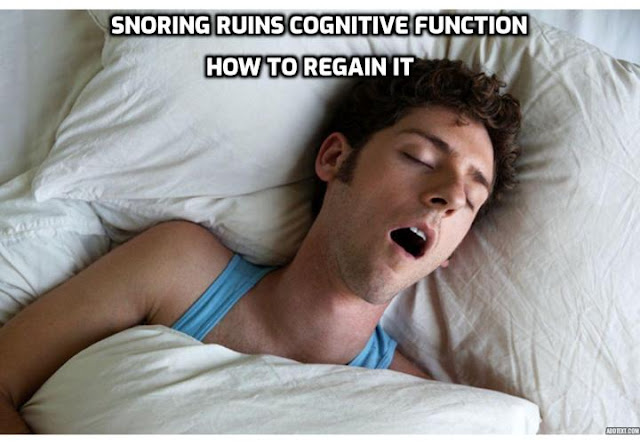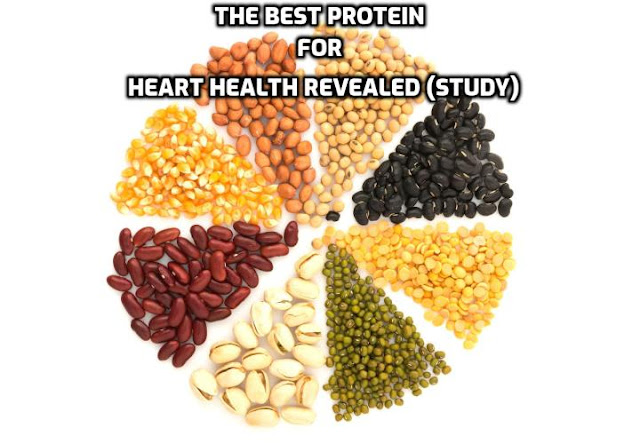 |
Click on Here to Find Out How You Can Get Rid of Snoring and Sleep Apnea |
Stop Snoring Immediately - Snoring
Ruins Cognitive Function – How to Regain It
Snoring is one of the
greatest indicators of sleep apnea, and sleep apnea has long been proven to cause cognitive impairment.
So,
the question is: If you feel like your memory is not as good as it used to be,
can you regain it by tackling your snoring and sleep apnea.
A
new study published in the Journal of the American Geriatrics Society has a
promising answer to this, but it has to be done in a specific way or your
cognitive function may rapidly worsen.
Scientists
consider mild cognitive impairment to be the stage between normal cognitive
status and Alzheimer’s disease.
This
is where you don’t have major problems accomplishing your daily tasks, but your
memory and decision-making are worse than those of people who age without
cognitive problems.
Continuous
positive airway pressure (or CPAP) has always been the gold standard of sleep apnea treatments, but as it requires you to sleep with an
uncomfortable face mask that forces air down your airway, most people do not
comply with the treatment.
The
authors of the new study examined whether the correct application of CPAP
treatment can reverse mild cognitive impairment that is caused by sleep apnea.
They
recruited 68 volunteers with mild cognitive impairment who had been presented
at sleep and geriatric clinics, and these volunteers were aged between 55 and
89.
The
researchers split them into a group that used CPAP and a group that did not.
They also monitored the CPAP user’s adherence to the treatment, with the
classification of adhering to the treatment being if they used it for at least
four hours per night over the course of a year.
After
a year, the scientists gave them a variety of tests to measure their ability to
learn and remember and their psychomotor/cognitive processing speed.
The
researchers found that there was a substantial improvement in the
psychomotor/cognitive processing speeds of those who adhered to the CPAP as
compared to those who did not use it. This also referred to actions that resulted
from conscious cognitive processing.
They
also experienced a small to medium improvement in memory, attention, daytime sleepiness, and everyday function.
However,
the cognitive abilities of those who did not use CPAP did not just stagnate.
Instead, they worsened. So, they did not just fail to improve, they declined.
The
researchers recommended that doctors inform their patients of studies like this
one to motivate them to use CPAP machines properly, but it is possible that
some people may still remain unconvinced.
After
all, if your poor sleep originates from having to wear an uncomfortable face
mask, you may not be convinced that cognitive improvements can result from such
poor sleep.
Stop Snoring Immediately - Weird
Sleep Apnea Myth Busted
Sleep apnea
is notoriously difficult to self-diagnose since you are, by definition, not
awake when the breathing pauses occur.
Similarly,
snoring
is often associated with sleep apnea but it’s not a clear diagnosis.
Researchers
have always believed that daytime sleepiness is one of sleep apnea’s most
common symptoms, and that this can serve as an indication that you might be a
sufferer.
But
a new study in the Journal Chest has now proven that it actually is not a
symptom of sleep apnea at all.
Instead,
there are three other factors that clearly indicate that you suffer sleep
apnea.
The
researchers wanted to compare short sleep duration and sleep apnea and their
effects on diabetes,
cardiovascular health, daytime sleepiness, and anxiety and depressive symptoms. This was to see which was actually responsible for the
worst consequences.
They
collected the medical data of 2,064 Brazilian adults who had participated in
the Brazilian Longitudinal Study of Adult Health. This included a full medical
examination, home sleep monitoring, a motor movement sensor to measure rest and
activity, and a sleep questionnaire.
The
participants were classified as having sleep apnea if they experienced more
than 15 breathing pauses per hour, and as having a short sleep duration if they
slept an average of fewer than six hours per 24-hour day.
32.9
percent of them suffered from sleep apnea and 27.2 percent were short sleepers.
Compared to their peers, the short sleepers were found to be 44 percent more
likely to struggle with daytime sleepiness.
However,
the most surprising finding was that people with sleep apnea were not more
likely to be sleepy during the day, as originally thought by most scientists
and medical practitioners.
While
they did find that people with sleep apnea were 10% more likely than the other
participants to be sleepy during the day, this finding was not statistically
significant, which meant that the researchers could not rule out that the
daytime sleepiness occurred randomly rather than being a direct cause of sleep
apnea.
One
of the causes of this lack of statistical significance may have been that
participants had to rate their own daytime sleepiness on a questionnaire. It is
possible that some people who were only slightly sleepy might have reported
themselves as sleepy, while others with mild sleepiness would have rated
themselves as fine.
Regarding
the other symptoms, people with sleep apnea were found to be worse off than
short sleepers were.
Compared
to people without sleep apnea, people with this sleep breathing disorder were
3.9 times more likely to be obese, 31 percent more likely to have high blood pressure and 24 percent more likely to have high cholesterol or other fats in their blood.
However,
Short sleeping did not have an effect on these three health indicators. This is
somewhat surprising, as many previous studies have linked short sleeping with
obesity and these heart problems.
Yet,
the conclusions of this study may have differed from previous studies because
they did not require participants to rate their own sleep duration on a
questionnaire, instead opting to test for it objectively via a wrist-worn
device.
Stop Snoring Immediately - Snoring
Causes a Sudden Death in Healthy People
A
new study published in the journal ERJ Open Research sheds some light on a baffling
question.
Why
are healthy people all over the world dropping dead from a heart attack without
any sign of heart injuries or abnormalities?
And
the only sign that something is wrong might be their snoring.
While
the researchers focused on fit young athletes, the same cause may apply to
anyone who snores.
They
recruited 42 male rugby players from the Nippon Sport Science University in
Japan who underwent cardiorespiratory assessments both whiles being awake and
asleep.
Impressively,
43 percent of them were found to suffer from sleep apnea, a percentage that the
authors discovered was higher than those found in the general population and
for older people.
Most
of the athletics suffered from a mild form of sleep apnea, with a few
struggling with a moderate form.
None
of them had severe sleep apnea.
Predictably,
compared with the athletes without sleep apnea, those with this disordered
breathing had lower blood oxygen levels and more periods where their blood
oxygen was extremely low. Importantly, they also experienced a higher pulse
rate, even while at rest.
These
are all indicators of a heart attack in the making.
80
percent of people suffering from sleep apnea have no idea that they have it.
And the only clear indicator is loud snoring.
Snoring
is almost always an indicator of some level of sleep apnea as it’s caused by
blockages in the breathing passages.
And
as this study shows, even a mild and moderate form of sleep apnea can lead to a
sudden heart attack, even in otherwise healthy individuals.
Watch
this video - How to Stop Snoring Immediately | How To Stop Storing Naturally | Snoring Exercises
The Stop Snoring and Sleep Apnea Program
offers a revolutionary new approach to help people treat sleep apnea symptoms.
Snoring is not only disruptive to our partners, but it poses health risks as
well, especially for people who suffer from sleep apnea.
This all-natural program will get you to shake
off your pesky and unhealthy snoring habit using only easy to perform natural
exercises.
You
may also like:


